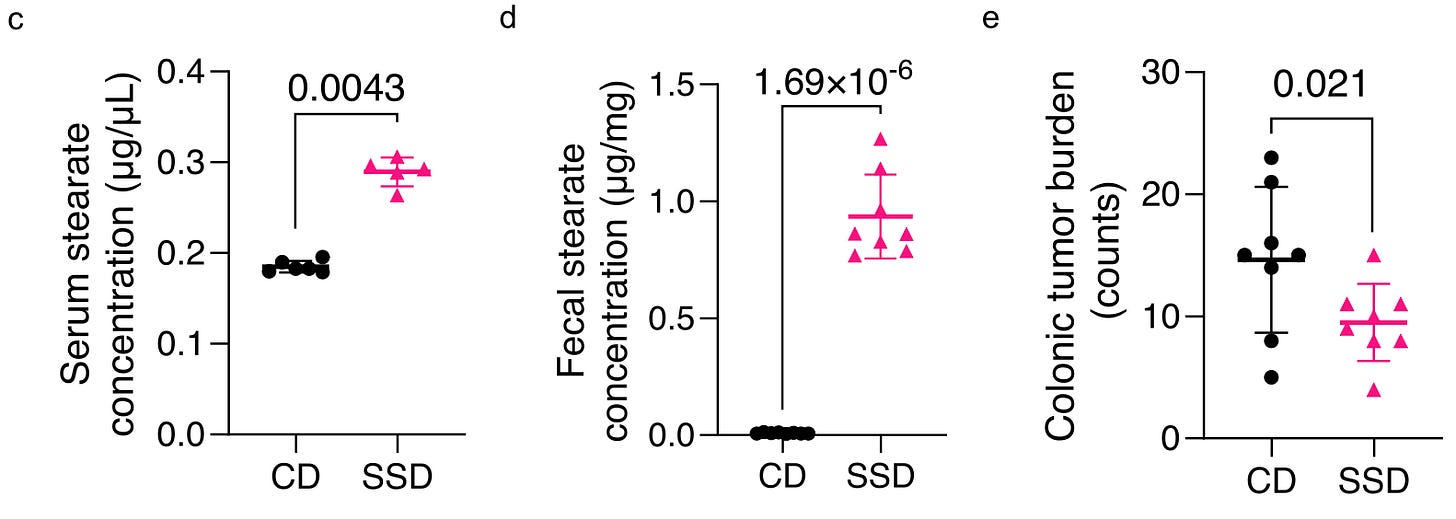Keto versus Colon Cancer: Microbiome Makes the Difference
Can a ketogenic diet reduce your risk of colon cancer? New research looks hopeful!
Can a ketogenic diet reduce your risk of colon cancer? New research looks hopeful! We're going to walk through the data, explain what it means, and tell you which foods are richest in the fat that researchers reveal is key to the anti-cancer effects of the ketogenic diet.
But first, let me give you a sense of the human burden of colorectal cancer (that’s the broader term, but to save syllables I’m just going to say “colon cancer”).
Colon cancer is the third most common form of cancer, with approximately 2 million new cases diagnosed each year, and the rate is increasing. It’s not exactly clear why colon cancer is becoming more common—especially among younger people, under 55—but it’s thought to be linked to lifestyle factors including diet, obesity, and smoking.
New Paper: Ketogenic diet suppresses colorectal cancer through the gut microbiome
But let’s jump into this research, which was conducted in microbiome-humanized mice. What this means is that, to make this experiment more relevant to people, researchers created humanized microbiome mice. Specifically, they took stool samples from five healthy human beings, mixed them together, and gave them to mice that had no microbiomes.
They then treated these humanized mice with compounds that cause intestinal inflammation and predispose them to develop colon cancer. After that, the mice were fed either a standard chow diet (SD) or a low-carb, high-fat ketogenic diet (KD), which increased circulating ketone levels.
Impressively, the keto mice exhibited fewer tumors, smaller tumors, and an overall lower tumor burden.
To prove a causal connection between the microbiome shift on the ketogenic diet and protection against colorectal cancer, the researchers transferred microbiomes from keto-fed mice into other mice who hadn’t eaten a ketogenic diet. This is called a “Fecal Microbiome Transplant.” Remarkably, the microbiome transplant recepiet mice (KC) similarly exhibited fewer tumors, smaller tumors, and an overall lower tumor burden.
Simply put: The ketogenic diet changed the microbiome in a way that protected against tumor growth.
Keto Diet Shifts Microbiome to Increases Stearic Acid
So, the next question is: How?
The ketogenic diet selected for a bacterial community that produced more stearic acid, an 18-carbon saturated fatty acid. This stearic acid had two main effects:
Stearic acid caused tumor cells themselves to die (apoptosis)
Stearic acid suppressed inflammation by decreasing levels and activity of inflammatory immune cells (Th17 cells).
It’s this one-two punch—targeting both the cancer cells and the inflammatory tumor microenvironment—that made the stearic acid produced in response to the ketogenic diet such a potent anti-cancer compound.
And it’s also worth noting that ketone bodies themselves may help prevent colon cancer and/or reduce cancer progression. The mechanisms by which ketones exert their anti-colon cancer potential are complex, but likely include that ketone bodies reduce inflammation, help with intestinal stem cell renewal, and signal through the cell surface receptor, HCAR2. For more details on colon cancer and metabolism, check out this review article by Dr Joseph Sedlack MD PhD, a classmate of mine at Harvard Medical School.
Dietary Stearic Acid Works Too!
Now, you might be wondering: What if the mice were fed more stearic acid directly?
In other words, does it matter whether the stearic acid was made by the microbiome or simply eaten? Well, the researchers anticipated your question.
Mice not eating a ketogenic diet were fed a stearate-supplemented diet (SSD), and the researchers saw a similar anti-cancer effect.
So, it appears that either dietary stearic acid or microbiome-derived stearic acid can offer the same protective benefits.
That said, practically speaking, it’s easier to eat more stearic acid when following a low-carb, high-fat diet. And, that overall dietary context likely matters when it comes to overall cancer risk in a human setting.
But more on that after we discuss what foods are rich in stearic acid.
Keep reading with a 7-day free trial
Subscribe to Nicholas’s Substack to keep reading this post and get 7 days of free access to the full post archives.








